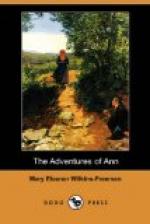“Well, of course he didn’t,” agreed the voice.
At last, Phineas came in, and Ann heard them go. She was so thankful. However, the future perplexities, which lay before her, were enough to keep her awake for the rest of the night. In the morning, a new anxiety beset her. The poor thief must have some breakfast. She could easily have smuggled some dry bread up to him; but she did want him to have some of the hot Indian mush, which the family had. Ann, impulsive in this as everything, now that she had made up her mind to protect a thief, wanted to do it handsomely. She did want him to have some of that hot mush; but how could she manage it?
The family at the breakfast table discussed the matter of the horse-thief pretty thoroughly. It was a hard ordeal for poor Ann, who could not take easily to deception. She had unexpected trouble too with Nabby. Nabby had waked up the preceding night.
“I didn’t see anything,” proclaimed Nabby; “but I heerd a noise. I think there’s mice out in the grain-chist in the back chamber.”
“I must go up there and look,” said Mrs. Polly. “They did considerable mischief, last year.”
Ann turned pale; what if she should take it into her head to look that day!
She watched her chance very narrowly for the hot mush; and after breakfast she caught a minute, when Phineas had gone to work, and Mrs. Polly was in the pantry, and Nabby down cellar. She had barely time to fill a bowl with mush, and scud.
How lightly she stepped over that back chamber floor, and how gingerly she opened the grain-chest lid. The thief looked piteously out at her from his bed of Indian corn. He was a handsome man, somewhere between forty and fifty. Indeed he came of a very good family in a town not so very far away. Horse-thiefs numbered some very respectable personages in their clan in those days sometimes.
They carried on a whispered conversation while he ate. It was arranged that Ann was to assist him off that night.
What a day poor Ann had, listening and watching in constant terror every moment, for fear something would betray her. Beside, her conscience troubled her sadly; she was far from being sure that she was doing right in hiding a thief from justice. But the poor man’s tears, and the mention of his daughter, had turned the scale with her; she could not give him up.
Her greatest fear was lest Mrs. Polly should take a notion to search for mice in the grain-chests. She so hoped Nabby would not broach the subject again. But there was a peculiarity about Nabby—she had an exceedingly bitter hatred of rats and mice. Still there was no danger of her investigating the grain-chests on her own account, for she was very much afraid. She would not have lifted one of those lids, with the chance of a rat or mouse being under it, for the world. If ever a mouse was seen in the kitchen Nabby took immediate refuge on the settle or the table and left some one else to do the fighting.




